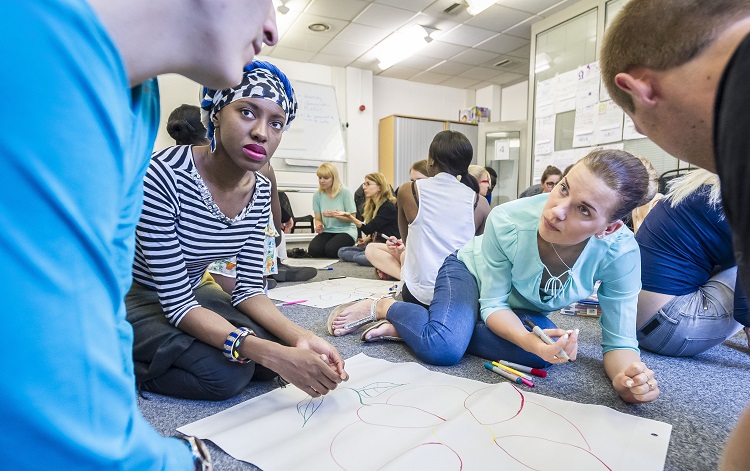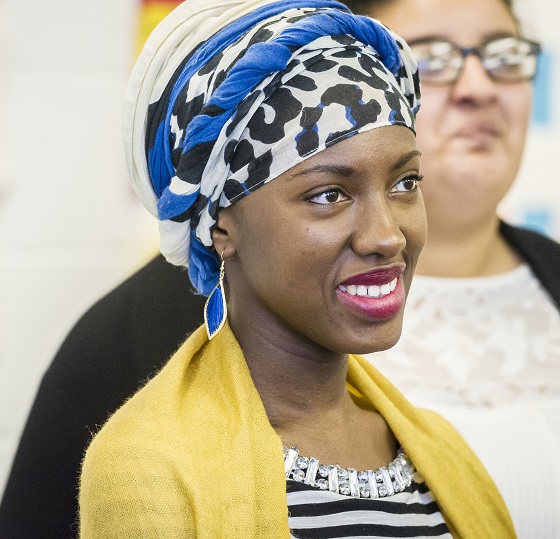Youth and community workers from across Europe have come to De Montfort University Leicester (DMU) to learn about diversity and to develop their ‘cultural competence’.

An eight-day seminar on ‘Diversity and Intercultural Competence’, which opened on Thursday (9 July), is being staged at the DMU Innovation Centre by Global Hands – a non-profit organisation set up by DMU students and staff to tackle global and local inequality.
The seminar, funded by Erasmus+, a European Commission programme managed by the British Council and partly focused on modernising youth work, has attracted nearly 30 delegates from Austria, Bulgaria, Croatia, Estonia, France, Hungary, Italy, Netherlands, Poland and Romania, as well as the UK. It is being supported by the Social Work, Youth and Community Development Department at DMU.
Delegates are being introduced to the concept of Social Rights in Europe, as derived from the Council of Europe’s European Social Charter. They will develop their knowledge of legislative frameworks and learn about informal approaches to education and key skills in this field.
Seminar leader Dr Momodou Sallah, Senior Lecturer in DMU’s Faculty of Health & Life Sciences, said: “The seminar will help these youth and community professionals develop interactive and innovative methods of engaging with young people across Europe, especially those on the margins of society who can find it difficult to access their social rights.
“We will discuss how these issues and methods of engagement can be translated over different cultures and across generations.
“It is a challenging programme that will force delegates to question their own values and attitudes as they look at the ‘dos and don’ts’ of different cultures and examine issues of gender, sexuality and disadvantage, as well as culture.
“We’re confident they’ll go back to their roles with a better understanding of diversity, better skills and a greater cultural competence.
“They’ll leave Leicester with a toolbox they can use to help them work in a more inter-cultural, inclusive way.”
It isn’t all classroom learning either. The group will be going out to visit local community projects, such as the Leicester Racial Equality Centre, and are holding an inter-cultural night to give delegates the chance to explore the history and culture of the different nationalities that have come together in their group.
Jasper Havermans (24), from Maastricht, works on communications for Global Human Rights Defence, based in The Hague (partners in the Erasmus+ programme). He is currently engaged in work concerning child trafficking in Nepal and forced conversion to Islam of Hindu and Christian girls in Pakistan.
Jasper, who completed his Master’s in Peace Studies at Bradford University last year, was enjoying the group emphasis on informal education: “I’m keen to share experiences with people from so many different countries and cultures and curious to learn about the work of their organisations.
“The non-formal learning comes with less hierarchy, it helps us to learn from each other and is more playful and fun compared to the more formal approach I’m used to. I find it inspiring and I’m looking forward to getting out into the Leicester community – we’re visiting a Sikh temple at the weekend.”

FROM PARIS: Massita Sissoko
Massita Sissoko (30), who has a Malian heritage, was born and lives in Paris. She works as an education consultant and was invited to attend the DMU seminar by the Brussels based African Diaspora Youth Network in Europe (ADYNE).
Massita said: “I think we can all benefit from discovering different countries and cultures but especially those who work with young people. I’m enjoying the non-formal approach to education; it’s very interesting, fun and it’s helping us all to mix and learn from each other.”
According to David Judge, Global Hands Director of Education and Public Engagement: “This seminar is an excellent opportunity to build the capacities of youth workers from eleven European countries to effectively engage with a wide range of young people, especially around the issues of diversity which is very relevant to Europe at the moment.
“Leicester is one of the most diverse cities in the world, reflecting a multiplicity of diversity rarely seen elsewhere as an example of tolerance; this is a great opportunity for participants to learn from the plurality of Leicester.
Posted on Friday 10 July 2015